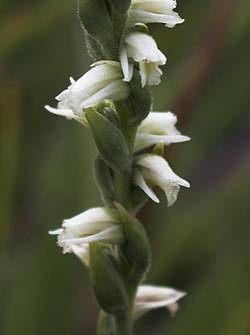Biology:Spiranthes casei
| Case's lady's tresses | |
|---|---|

| |
| Scientific classification | |
| Kingdom: | Plantae |
| Clade: | Tracheophytes |
| Clade: | Angiosperms |
| Clade: | Monocots |
| Order: | Asparagales |
| Family: | Orchidaceae |
| Subfamily: | Orchidoideae |
| Tribe: | Cranichideae |
| Genus: | Spiranthes |
| Species: | S. casei
|
| Binomial name | |
| Spiranthes casei Catling & Cruise
| |
Spiranthes casei, or Case's lady's tresses, is a species of orchid native to the northeastern United States and Canada.[1][2]
Description
Spiranthes casei plants are 7–44 cm tall. They have both basal and stem leaves and the basal leaves can still be present when flowering in August and September. As with all Spiranthes flowers are arranged in a spiral around the stem, and each flower has 3 petals and 3 sepals which together give it a tube-like shape. The petals and sepals have an ivory to yellowish white or greenish cream color. [3]
Spiranthes casei is very closely related to and looks similar to Spiranthes ochroleuca but has smaller flowers, the dorsal (top) sepal and tips of the side petals are not recurved, and they have a comparatively reduced labellum. [4]
Distribution and habitat
Spiranthes casei has been found in Maine, Michigan, Minnesota, New Hampshire, New York, Pennsylvania, Vermont and Wisconsin in the US and in Nova Scotia, Ontario and Quebec in Canada. [5] It grows in forest, shrubland and grassland, mostly restricted to the lichen and bracken barrens of the Great Lakes Basin and the Canadian maritime provinces. [1][4]
Taxonomy
Spiranthes casei was first described by P. M. Catling & J. E. Cruise in 1975. They named the new species after orchid researcher Frederick W. Case II. Before Catling & Cruise described it as a new species specimens of Spiranthes casei were often labeled as a hybrid between Spiranthes cernua and Spiranthes lacera or as a northern version of Spiranthes vernalis. The oldest herbarium specimen they could find was collected in Ontario in 1904. [6][7]
References
- ↑ 1.0 1.1 1.2 Romand-Monnier, F. (2013). "Spiranthes casei". IUCN Red List of Threatened Species 2013: e.T44393427A44460201. https://www.iucnredlist.org/species/44393427/44460201.
- ↑ "Spiranthes casei". North American Orchid Conservation Center (NAOOC), Smithsonian Environmental Research Center. 2018. http://goorchids.northamericanorchidcenter.org/species/spiranthes/casei.
- ↑ Flora of North America Editorial Committee, ed., "Spiranthes casei", Flora of North America North of Mexico (FNA), New York and Oxford, http://www.efloras.org/florataxon.aspx?flora_id=1&taxon_id=
- ↑ 4.0 4.1 Pace, Matthew C.; Cameron, Kenneth M. (27 December 2017). "The Systematics of the Spiranthes cernua Species Complex (Orchidaceae): Untangling the Gordian Knot". Systematic Botany 42 (4): 640–669. doi:10.1600/036364417x696537.
- ↑ "Spiranthes casei". Royal Botanic Gardens, Kew. https://powo.science.kew.org/taxon/urn:lsid:ipni.org:names:242524-2.
- ↑ Template:Ipni
- ↑ Catling, P. M.; Cruise, J. E. (1975). "Spiranthes casei, a new species from northeastern North America". Rhodora 76: 526–536.
Wikidata ☰ Q15450570 entry
 |


